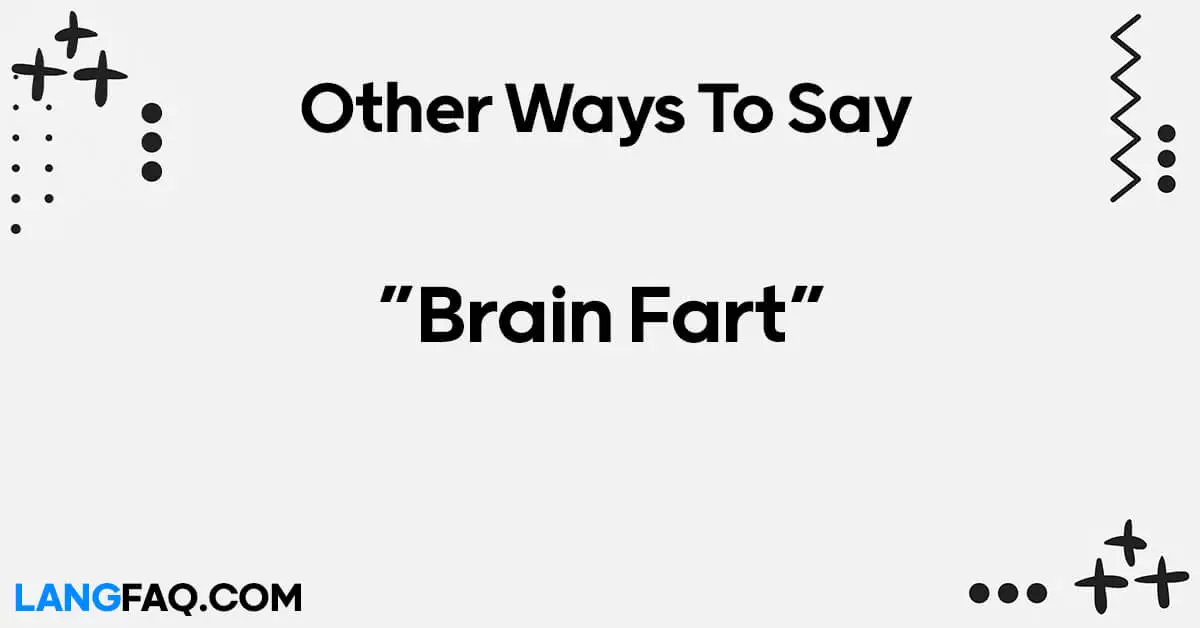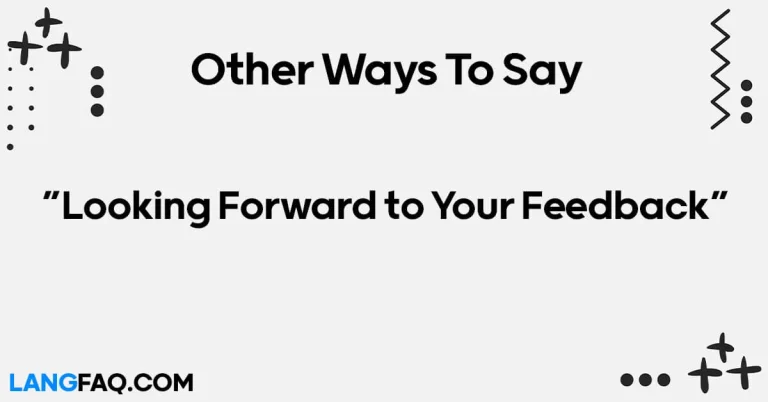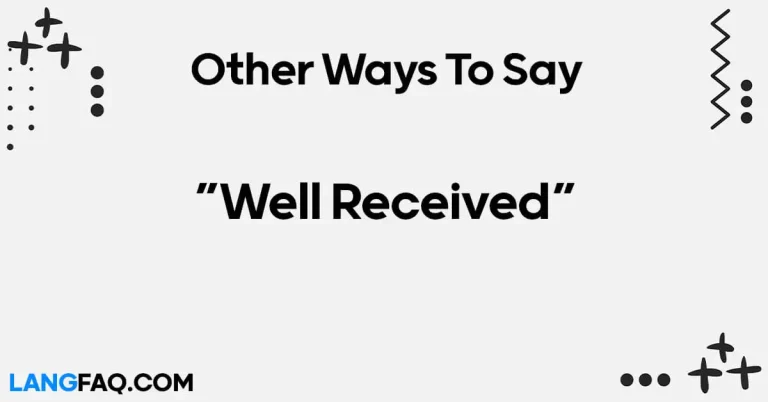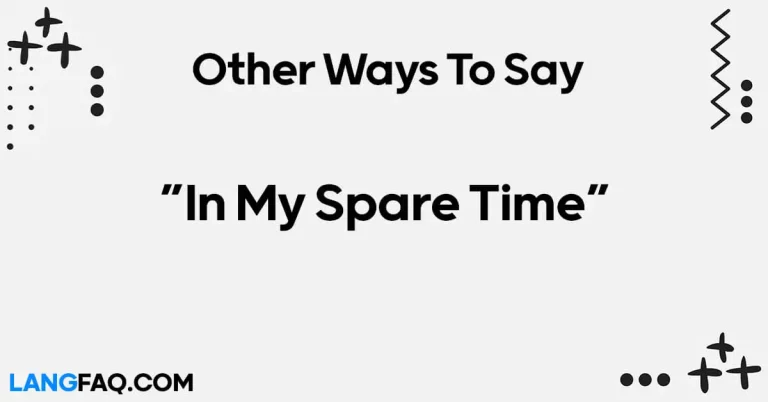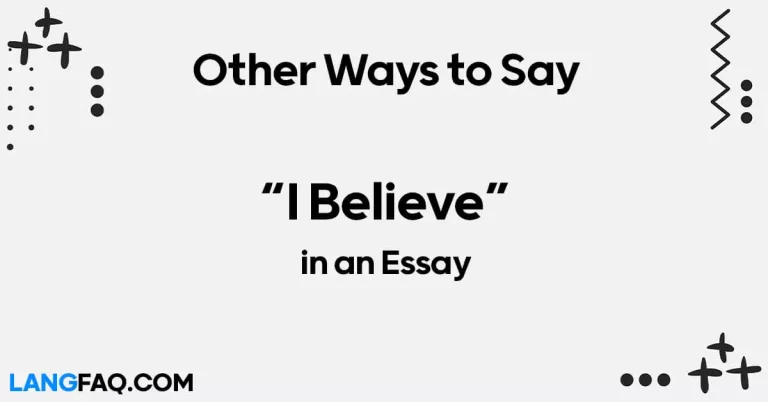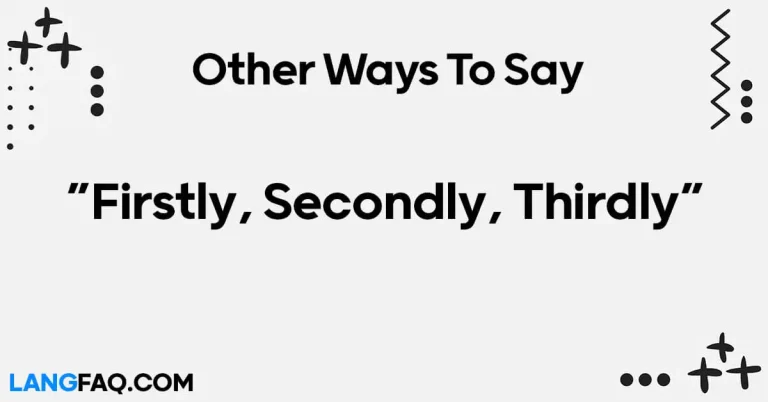In the fast-paced world we navigate daily, moments of mental lapse are inevitable. Instead of fixating on the term “Brain Fart,” let’s embark on a linguistic journey to explore 12 alternative expressions for these amusing cognitive hiccups. From colloquial gems to witty idioms, this article promises to bring a smile to your face while shedding light on the universal experience of occasional mental blanks.
12 Other Ways to Say “Brain Fart”
Here are 12 alternative expressions for “Brain Fart”:
- Mind Freeze Meltdown
- Thought Tango Tumble
- Intellectual Hiccup
- Cerebral Glitch
- Memory Mirage Moment
- Cogitation Confusion
- Neural Hiccup Havoc
- Intellect Interruption
- Brainwave Blip
- Thought Thunderstorm
- Cognitive Quirk
- Mind Misfire Moment
| Expression | Meaning | Example |
|---|---|---|
| Mind Freeze Meltdown | Temporary mental block or freeze | “During the presentation, I had a mind freeze meltdown and forgot my main points.” |
| Thought Tango Tumble | Chaotic dance of thoughts | “My thoughts did a thought tango tumble, and I couldn’t remember where I put my keys.” |
| Intellectual Hiccup | Brief interruption in intellectual process | “I had an intellectual hiccup and couldn’t recall the author’s name during the discussion.” |
| Cerebral Glitch | Temporary malfunction in thought process | “The sudden pause in my speech was a cerebral glitch, making me lose track of my argument.” |
| Memory Mirage Moment | Illusionary disappearance of memory | “It was a memory mirage moment; I thought I had left my phone on the table, but it was in my pocket.” |
| Cogitation Confusion | Perplexity in deep thinking | “The complexity of the problem led to cogitation confusion, and I struggled to find a solution.” |
| Neural Hiccup Havoc | Disruption in neural firing | “Neural hiccup havoc struck when I couldn’t recall the answer to a simple trivia question.” |
| Intellect Interruption | Momentary pause in intellectual flow | “Mid-sentence, there was an intellect interruption, and I had to gather my thoughts before continuing.” |
| Brainwave Blip | Momentary disruption in brainwave patterns | “My sudden forgetfulness was just a brainwave blip, and I quickly regained my train of thought.” |
| Thought Thunderstorm | Clashing and chaotic influx of thoughts | “In the thought thunderstorm of ideas, I struggled to prioritize which task to tackle first.” |
| Cognitive Quirk | Eccentricity or peculiar mental behavior | “His cognitive quirk of associating colors with numbers always fascinated me.” |
| Mind Misfire Moment | Unexpected misstep in thought processing | “In a mind misfire moment, I called my colleague by the wrong name during the meeting.” |
The English language offers a delightful array of expressions to describe those amusing mental lapses we all experience. From mind freeze meltdowns to thought thunderstorms, these phrases add a touch of humor and vividness to the common phenomenon of forgetfulness. So, the next time you have a cognitive quirk or a brainwave blip, embrace the linguistic diversity in describing your momentary lapses in thought!
Is It Correct to Say “Brain Fart”?
Brain Fart: An Exploration of the Language’s Quirks
In the realm of informal language and colloquial expressions, the term “Brain Fart” has found its way into everyday conversation. While it is a widely used and accepted idiom, its appropriateness depends on the context and audience.
Is it Correct?
Yes, in Informal Settings:
- In casual, informal conversations among friends, family, or colleagues who share a comfortable relationship, using “Brain Fart” is generally acceptable.
- It’s commonly employed to describe those moments when one experiences a temporary lapse in memory or thought.
No, in Formal or Professional Settings:
- In formal or professional settings, the term might be considered too casual and may not align with the expected level of professionalism.
- It’s advisable to use more formal expressions like “momentary lapse of memory” or “temporary mental block” in professional communication.
Context Matters:
Among Peers:
- In a relaxed atmosphere with peers or friends, using “Brain Fart” can add a touch of humor and relatability to the conversation.
In Professional Communication:
- In professional emails, reports, or meetings, it’s recommended to opt for more formal language to maintain a level of professionalism.
Alternative Expressions:
Casual:
- “Had a bit of a mental hiccup there.”
- “My mind went blank for a moment.”
Formal:
- “Experienced a momentary lapse in recollection.”
- “Encountered a temporary interruption in thought processes.”
Professional Mail Example With “Brain Fart”
Subject: Apology for the Brain Fart in Today’s Meeting
Dear [Recipient’s Name],
I hope this message finds you well. I am writing to extend my sincere apologies for the Brain Fart moment during our team meeting earlier today.
In the midst of discussing the upcoming project milestones, I experienced a brief lapse in memory, which led to a temporary disruption in my contribution to the conversation. I want to assure you that I am committed to maintaining a high level of focus and professionalism in our meetings.
I recognize the importance of our collaborative efforts, and I understand that any distraction, no matter how momentary, can impact the efficiency of our discussions. Moving forward, I am implementing additional strategies to ensure that I am better prepared for our meetings and can contribute more effectively to our shared objectives.
I appreciate your understanding and patience in this matter. If there are specific areas where you feel my contributions fell short today, I would welcome the opportunity to discuss them further and explore ways to enhance my participation in future meetings.
Thank you for your understanding, and I look forward to our continued collaboration.
Best regards,
[Your Full Name] [Your Position] [Your Company]
Mind Freeze Meltdown: Navigating the Arctic of Forgetfulness
In the vast landscape of linguistic expressions, “Mind Freeze Meltdown” stands out as a whimsical term to describe those moments when your thoughts seem to turn into icicles. This phrase adds a touch of playfulness to the common experience of mental lapses, whether in professional settings or casual conversations.
Definition and Usage: A Mind Freeze Meltdown refers to a temporary mental block, akin to the sudden pause that occurs when your brain encounters an unexpected obstacle in the thought process.
Example Scenario: Formal Context (Work Meeting): During a crucial work presentation, you might find yourself experiencing a Mind Freeze Meltdown when asked an unexpected question. Responding with humor can defuse tension and showcase your ability to handle pressure.
Informal Context (Coffee Chat with Friends): In a lighthearted coffee chat with friends, describing how you had a Mind Freeze Meltdown when trying to recall a movie title adds humor to the conversation.
Variations:
- Colleagues: Mind Frost Fumble
- Friends: Brain Chill Blooper
- Mentor-Mentee: Cognitive Cold Snap
Pro Tips:
- Embrace the phrase with a smile to lighten the mood during serious discussions.
- Use it sparingly to maintain its impact and novelty.
Example Sentence:
Email Sample:
Subject: Apology for the Mind Freeze Meltdown in Today’s Meeting
Dear [Recipient],
I hope this email finds you well. I wanted to express my sincere apologies for the Mind Freeze Meltdown during today’s meeting. The unexpected question caught me off guard, but I am committed to providing a more thorough response moving forward.
Best regards, [Your Name]
Thought Tango Tumble: Dancing Through the Chaos of Ideas
In the intricate world of cognitive expression, “Thought Tango Tumble” paints a vivid picture of thoughts engaged in a lively dance, only to tumble into chaos. This phrase adds a creative flair to discussions about the tangled mess our minds sometimes find themselves in.
Definition and Usage: Thought Tango Tumble describes the chaotic dance of thoughts, symbolizing the entanglement that can occur during complex mental processes.
Example Scenario: Formal Context (Project Brainstorming): When navigating a brainstorming session, acknowledging a Thought Tango Tumble can convey the complexity of the ideas under discussion. It’s a creative way to express the challenges in organizing thoughts.
Informal Context (Casual Conversation): In casual conversations, sharing how your thoughts did a Thought Tango Tumble when trying to recall a friend’s name makes the lapse relatable and humorous.
Variations:
- Colleagues: Idea Ballet Bungle
- Friends: Mind Waltz Whirl
- Mentor-Mentee: Intellectual Jive Jumble
Pro Tips:
- Use this phrase when discussing the creative process or brainstorming sessions.
- Employ it to highlight the dynamic nature of thoughts in a positive light.
Example Sentence:
Email Sample:
Subject: Embracing the Thought Tango Tumble in Our Creative Process
Dear Team,
I wanted to reflect on our recent brainstorming session and acknowledge the Thought Tango Tumble we experienced. The whirlwind of ideas showcased our team’s creativity, and I’m excited to untangle the threads as we move forward with the project.
Best regards, [Your Name]
Intellectual Hiccup: Navigating Brief Interruptions in Thought
In the symphony of cognitive processes, an “Intellectual Hiccup” is a subtle acknowledgment of the occasional interruptions that occur in our intellectual flow. This phrase provides a nuanced way to express momentary lapses, balancing formality with a touch of whimsy.
Definition and Usage: An Intellectual Hiccup refers to a brief interruption in the intellectual process, where thoughts experience a momentary pause or hiccup.
Example Scenario: Formal Context (Professional Meeting): During a professional meeting, admitting to an Intellectual Hiccup when you momentarily lose track of a complex discussion point demonstrates humility and transparency.
Informal Context (Dinner Conversation): Sharing a moment of Intellectual Hiccup during a dinner conversation with friends showcases vulnerability and adds a relatable aspect to the discussion.
Variations:
- Colleagues: Brain Pause Blip
- Friends: Wisdom Wobble Pause
- Mentor-Mentee: Knowledge Stutter Pause
Pro Tips:
- Use it judiciously in professional settings to maintain a balance between formality and relatability.
- Leverage this phrase to foster an environment of openness and understanding.
Example Sentence:
Email Sample:
Subject: Acknowledging an Intellectual Hiccup in Today’s Discussion
Dear [Recipient],
I hope this email finds you well. I wanted to acknowledge a brief Intellectual Hiccup during today’s discussion. My momentary pause was due to a need for additional information, and I am committed to providing a more comprehensive response in our next meeting.
Best regards, [Your Name]
Cerebral Glitch: Navigating Temporary Malfunctions in Thought
In the realm of cognitive landscapes, a “Cerebral Glitch” is a whimsical term that vividly captures those moments when the intricate machinery of our thoughts experiences a temporary malfunction. This phrase adds a touch of technicality to the understanding of cognitive lapses.
Definition and Usage: A Cerebral Glitch denotes a temporary malfunction in the thought process, akin to a momentary disruption in the seamless flow of cognitive functions.
Example Scenario: Formal Context (Conference Call): Explaining a Cerebral Glitch during a conference call, where you momentarily struggle to articulate a point, adds a touch of humor while maintaining professionalism.
Informal Context (Friend Gathering): Describing a Cerebral Glitch in an informal setting, such as a friend gathering, makes the lapse relatable and turns it into a shared moment of laughter.
Variations:
- Colleagues: Brain Circuit Blip
- Friends: Thought Tech Trip
- Mentor-Mentee: Cognitive Software Snag
Pro Tips:
- Use it in technical or professional discussions to infuse a lighthearted tone.
- Avoid overusing to maintain the impact of the term.
Example Sentence:
Email Sample:
Subject: Addressing the Cerebral Glitch in Today’s Presentation
Dear Team,
I wanted to address the Cerebral Glitch in today’s presentation. The momentary lapse in my explanation was a temporary hiccup, and I appreciate your understanding as we move forward with refining our approach.
Best regards, [Your Name]
Memory Mirage Moment: Unveiling Illusionary Disappearances of Memory
In the vast desert of cognitive experiences, a “Memory Mirage Moment” depicts those instances when memories seem to shimmer and momentarily disappear, creating a captivating illusion. This phrase adds a poetic touch to the common occurrence of temporary memory lapses.
Definition and Usage: A Memory Mirage Moment refers to the illusionary disappearance of memory, where recollections momentarily seem elusive, akin to a mirage in the desert.
Example Scenario: Formal Context (Project Update): During a formal project update, admitting to a Memory Mirage Moment when forgetting a specific detail demonstrates transparency and invites collaborative problem-solving.
Informal Context (Family Gathering): Sharing a Memory Mirage Moment during a family gathering, where you momentarily forget a relative’s name, turns the lapse into a humorous family anecdote.
Variations:
- Colleagues: Recall Mirage Episode
- Friends: Mind Mirage Blip
- Mentor-Mentee: Memory Illusion Pause
Pro Tips:
- Use this phrase in storytelling to add a touch of imagination to everyday experiences.
- Employ it sparingly to maintain its enchanting quality.
Example Sentence:
Email Sample:
Subject: Embracing a Memory Mirage Moment in Today’s Discussion
Dear [Recipient],
I hope this email finds you well. I wanted to share a brief Memory Mirage Moment during today’s discussion. The elusive memory was a temporary blip, and I am committed to ensuring all details are thoroughly covered in our next meeting.
Best regards, [Your Name]
Cogitation Confusion: Untangling Perplexities in Deep Thinking
In the realm of profound contemplation, “Cogitation Confusion” encapsulates those moments when deep thoughts become entangled in a perplexing dance. This phrase adds a touch of sophistication to discussions about the intricate nature of cognition.
Definition and Usage: Cogitation Confusion refers to the perplexity in deep thinking, where the complexities of thought processes lead to temporary confusion.
Example Scenario: Formal Context (Research Discussion): Acknowledging Cogitation Confusion during a research discussion demonstrates a keen awareness of the intricate nature of the subject matter and invites collaborative problem-solving.
Informal Context (Book Club): Describing a Cogitation Confusion moment during a book club meeting, where you grapple with the nuances of the plot, adds depth to literary discussions.
Variations:
- Colleagues: Thought Puzzle Perplexity
- Friends: Intellectual Maze Muddle
- Mentor-Mentee: Wisdom Riddle Ruffle
Pro Tips:
- Use this phrase in intellectual or academic contexts to showcase a nuanced understanding.
- Pair it with examples to illustrate the complexities of thought processes.
Example Sentence:
Email Sample:
Subject: Exploring Cogitation Confusion in Today’s Research Meeting
Dear Team,
I wanted to reflect on today’s research meeting and acknowledge a moment of Cogitation Confusion. The intricacies of the topic require careful consideration, and I look forward to collaborating on untangling the complexities.
Best regards, [Your Name]
Neural Hiccup Havoc: Embracing the Playful Side of Cognitive Glitches
In the intricate dance of neurons, a “Neural Hiccup Havoc” represents the playful disruption in the firing of brain cells, leading to amusing cognitive glitches. This phrase injects a sense of whimsy into discussions about the occasional missteps of our neural pathways.
Definition and Usage: Neural Hiccup Havoc refers to the disruption in neural firing, akin to playful missteps in the intricate dance of brain cells.
Example Scenario: Formal Context (Training Session): During a formal training session, acknowledging Neural Hiccup Havoc when momentarily forgetting a specific detail demonstrates humility and encourages a positive learning environment.
Informal Context (Casual Discussion): Sharing a Neural Hiccup Havoc moment in a casual discussion about hobbies, where you forget the name of a favorite book, adds a relatable and humorous element.
Variations:
- Colleagues: Brain Misfire Mayhem
- Friends: Neuron Jive Jolt
- Mentor-Mentee: Synaptic Stumble Surge
Pro Tips:
- Use this phrase to add a lighthearted touch to discussions about learning and growth.
- Employ it judiciously to maintain its impact and to keep the focus on positivity.
Example Sentence:
Email Sample:
Subject: Embracing Neural Hiccup Havoc in Today’s Learning Session
Dear [Recipient],
I hope this email finds you well. I wanted to share a moment of Neural Hiccup Havoc during today’s learning session. Mistakes are part of the learning process, and I appreciate the supportive environment as we navigate new concepts together.
Best regards, [Your Name]
Intellect Interruption: Navigating Momentary Pauses in Deep Thought
In the grand symphony of intellectual pursuits, an “Intellect Interruption” represents a brief pause in the graceful flow of deep thought. This phrase provides a nuanced and formal way to express the temporary interruptions that occur in the intellectual process.
Definition and Usage: Intellect Interruption refers to a momentary pause in the intellectual flow, where thoughts experience a temporary interruption or interruption.
Example Scenario: Formal Context (Board Meeting): Acknowledging an Intellect Interruption during a board meeting when momentarily losing track of a complex discussion point demonstrates transparency and commitment to accuracy.
Informal Context (Book Club): Sharing an Intellect Interruption moment during a book club discussion, where you grapple with the deeper themes of a novel, adds a layer of thoughtfulness to literary conversations.
Variations:
- Colleagues: Wisdom Break Break
- Friends: Idea Pause Pause
- Mentor-Mentee: Thought Halt Halt
Pro Tips:
- Use this phrase in formal settings to convey a sense of intellectual depth and mindfulness.
- Pair it with examples to illustrate the commitment to precision and thorough understanding.
Example Sentence:
Email Sample:
Subject: Addressing an Intellect Interruption in Today’s Discussion
Dear [Recipient],
I hope this email finds you well. I wanted to address a momentary Intellect Interruption during today’s discussion. Clarity is paramount in our conversations, and I am committed to providing more comprehensive insights in our future meetings.
Best regards, [Your Name]
Brainwave Blip: Navigating the Spark of Temporary Cognitive Disruptions
In the rhythmic hum of brainwaves, a “Brainwave Blip” captures the essence of a momentary disruption in the smooth electrical patterns of the mind. This phrase injects a sense of playfulness into discussions about the occasional misfires of our cerebral processes.
Definition and Usage: A Brainwave Blip refers to a momentary disruption in brainwave patterns, creating a temporary spark or blip in the usual smooth flow of cognitive processes.
Example Scenario: Formal Context (Project Planning): During a formal project planning meeting, acknowledging a Brainwave Blip when temporarily forgetting a critical detail showcases transparency and a proactive approach to addressing potential challenges.
Informal Context (Coffee Break): Sharing a Brainwave Blip moment during a casual coffee break with colleagues, where you momentarily forget a colleague’s name, adds humor and fosters camaraderie.
Variations:
- Colleagues: Mind Pulse Pause
- Friends: Thought Surge Stumble
- Mentor-Mentee: Cognitive Pulse Flicker
Pro Tips:
- Use this phrase to add a touch of playfulness to discussions about problem-solving and adaptability.
- Employ it judiciously to maintain its impact and to keep the atmosphere light.
Example Sentence:
Email Sample:
Subject: Embracing a Brainwave Blip in Today’s Brainstorming Session
Dear Team,
I hope this email finds you well. I wanted to share a moment of Brainwave Blip during today’s brainstorming session. These creative hiccups are part of the innovation process, and I’m excited to see how we navigate them together.
Best regards, [Your Name]
Thought Thunderstorm: Navigating the Clashing Currents of Ideas
In the atmospheric theater of the mind, a “Thought Thunderstorm” captures the intensity of clashing and chaotic influxes of thoughts. This phrase provides a dramatic yet relatable way to express the challenges of prioritizing ideas during moments of mental turbulence.
Definition and Usage: Thought Thunderstorm refers to a mental phenomenon where thoughts pour down like rain, clashing and creating a chaotic influx, often making it challenging to prioritize and organize ideas.
Example Scenario: Formal Context (Strategy Meeting): Discussing a Thought Thunderstorm during a strategy meeting adds a vivid metaphor to the complexities of brainstorming sessions and the need for effective idea prioritization.
Informal Context (Friend Gathering): Describing a Thought Thunderstorm during a friendly gathering, where you grapple with various thoughts about future plans, turns the mental chaos into a relatable and humorous anecdote.
Variations:
- Colleagues: Idea Cyclone Clash
- Friends: Mind Tempest Tangle
- Mentor-Mentee: Creativity Storm Surge
Pro Tips:
- Use this phrase to illustrate the dynamic nature of ideation processes.
- Employ it when discussing creative challenges or project brainstorming sessions.
Example Sentence:
Email Sample:
Subject: Navigating a Thought Thunderstorm in Today’s Strategy Meeting
Dear [Recipient],
I wanted to reflect on today’s strategy meeting and acknowledge the presence of a Thought Thunderstorm. Prioritizing ideas amidst the creative chaos is a shared challenge, and I look forward to collaborating on effective strategies.
Best regards, [Your Name]
Cognitive Quirk: Embracing the Eccentricities of Thought
In the realm of mental idiosyncrasies, a “Cognitive Quirk” highlights the peculiarities and eccentricities that make each person’s thought processes unique. This phrase provides a positive and appreciative perspective on the quirks that shape our individual cognitive landscapes.
Definition and Usage: Cognitive Quirk refers to the distinctive and eccentric aspects of thought processes that contribute to the uniqueness of an individual’s cognitive style.
Example Scenario: Formal Context (Team Collaboration): Acknowledging a Cognitive Quirk during a team collaboration session fosters an inclusive environment, recognizing and appreciating the diversity of thought within the group.
Informal Context (Friend Gathering): Sharing a Cognitive Quirk during a casual gathering with friends, where you reveal a peculiar way of approaching problem-solving, adds a layer of humor to the conversation.
Variations:
- Colleagues: Thought Eccentricity
- Friends: Mind Oddity Charm
- Mentor-Mentee: Intellectual Quirk Flair
Pro Tips:
- Use this phrase to celebrate the diversity of thought within teams or groups.
- Employ it to foster a positive and inclusive atmosphere, encouraging open discussions about individual cognitive styles.
Example Sentence:
Email Sample:
Subject: Embracing Cognitive Quirks for Team Innovation
Dear Team,
I hope this email finds you well. I wanted to take a moment to acknowledge and celebrate the Cognitive Quirks within our team. These unique perspectives contribute to our collective creativity, and I look forward to exploring innovative solutions together.
Best regards, [Your Name]
Mind Misfire Moment: Navigating the Spark of Unexpected Cognitive Missteps
In the dynamic landscape of thought, a “Mind Misfire Moment” vividly captures those instances when thoughts misfire like sparks, resulting in unexpected cognitive missteps. This phrase injects a sense of immediacy and playfulness into discussions about the unpredictability of our cognitive processes.
Definition and Usage: Mind Misfire Moment refers to an unexpected and spontaneous misstep in thought processes, akin to a spark that momentarily disrupts the usual flow.
Example Scenario: Formal Context (Client Presentation): Acknowledging a Mind Misfire Moment during a client presentation, where you momentarily struggle to recall a key detail, showcases transparency and humanizes the presenter-client relationship.
Informal Context (Family Dinner): Sharing a Mind Misfire Moment during a family dinner, where you forget a family anecdote, turns the lapse into a relatable and humorous family story.
Variations:
- Colleagues: Brain Glitch Fumble
- Friends: Thought Misstep Spark
- Mentor-Mentee: Intellectual Stumble Flash
Pro Tips:
- Use this phrase to convey a sense of spontaneity and relatability in professional and personal settings.
- Employ it judiciously to maintain its impact and to keep the atmosphere light.
Example Sentence:
Email Sample:
Subject: Embracing a Mind Misfire Moment in Today’s Presentation
Dear [Recipient],
I hope this email finds you well. I wanted to share a moment of Mind Misfire during today’s presentation. These unexpected moments keep us on our toes, and I appreciate your understanding as we navigate the nuances of our work.
Best regards, [Your Name]
FAQ
1. What Causes Brain Farts?
Occasional lapses in memory can be attributed to various factors, including stress, lack of sleep, and distractions. These factors can disrupt the normal functioning of the brain, leading to momentary lapses.
2. Are Brain Farts Normal?
Yes, occasional brain farts are entirely normal. Everyone experiences moments of forgetfulness, and it’s a natural part of the complex cognitive processes our brains engage in daily.
3. Can Chronic Stress Contribute to Frequent Brain Farts?
Absolutely. Chronic stress can have a significant impact on cognitive function, leading to more frequent episodes of forgetfulness. Managing stress through relaxation techniques and self-care is crucial.
4. How Can I Improve Memory Recall?
Simple lifestyle changes, such as getting adequate sleep, staying physically active, and maintaining a balanced diet, can positively impact memory recall. Additionally, engaging in activities that stimulate the brain, like puzzles and learning new skills, can enhance cognitive function.
5. Are There Age-Related Factors in Experiencing Brain Farts?
While occasional forgetfulness is common at any age, aging can affect memory. However, adopting a healthy lifestyle and staying mentally active can mitigate age-related cognitive decline.
6. Can Brain Farts Indicate an Underlying Health Issue?
In some cases, persistent memory issues may signal an underlying health concern. If you notice a sudden and significant decline in cognitive function, it’s advisable to consult with a healthcare professional for a thorough evaluation.
Conclusion:
Navigating the occasional brain lapse is a shared human experience. Embracing the myriad ways to express these moments adds a touch of humor to our daily lives. So, the next time you experience a Mind Freeze Meltdown or a Thought Thunderstorm, remember, it’s just a part of the fascinating cognitive dance we all participate in.

